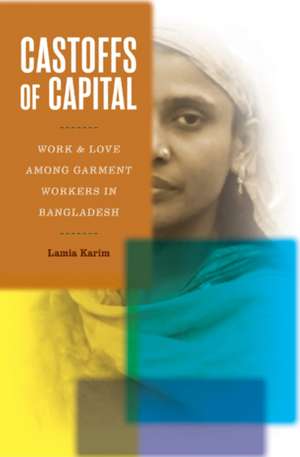Castoffs of Capital: Work and Love among Garment Workers in Bangladesh
Autor Lamia Karimen Limba Engleză Hardback – 22 noi 2022
FINALIST FOR THE GREGORY BATESON PRIZE FROM THE AMERICAN ANTHROPOLOGICAL ASSOCIATION
Dispelling stereotypes about garment workers in the global apparel industry
Castoffs of Capital examines how female garment workers experience their work and personal lives within the stranglehold of global capital. Drawing on fieldwork in Bangladesh, anthropologist Lamia Karim focuses attention onto the lives of older women aged out of factory work, heretofore largely ignored, thereby introducing a new dimension to the understanding of a female-headed workforce that today numbers around four million in Bangladesh.
Bringing a feminist labor studies lens, Castoffs of Capital foregrounds these women not only as workers but as mothers, wives, sisters, lovers, friends, and political agents. Focusing on relations among work, gender, and global capital’s targeting of poor women to advance its market penetration, Karim shows how women navigate these spaces by adopting new subject formations. She locates these women’s aspirations for the “good life” not only in material comforts but also in their longings for love and sexual fulfillment that help them momentarily forget the precarity of their existence under the shadow of capital.
Through richly detailed ethnographic studies, this innovative and beautifully written book examines the making and unmaking of these women’s wants and desires, loves and tribulations, hopes and despairs, and triumphs and struggles.
Dispelling stereotypes about garment workers in the global apparel industry
Castoffs of Capital examines how female garment workers experience their work and personal lives within the stranglehold of global capital. Drawing on fieldwork in Bangladesh, anthropologist Lamia Karim focuses attention onto the lives of older women aged out of factory work, heretofore largely ignored, thereby introducing a new dimension to the understanding of a female-headed workforce that today numbers around four million in Bangladesh.
Bringing a feminist labor studies lens, Castoffs of Capital foregrounds these women not only as workers but as mothers, wives, sisters, lovers, friends, and political agents. Focusing on relations among work, gender, and global capital’s targeting of poor women to advance its market penetration, Karim shows how women navigate these spaces by adopting new subject formations. She locates these women’s aspirations for the “good life” not only in material comforts but also in their longings for love and sexual fulfillment that help them momentarily forget the precarity of their existence under the shadow of capital.
Through richly detailed ethnographic studies, this innovative and beautifully written book examines the making and unmaking of these women’s wants and desires, loves and tribulations, hopes and despairs, and triumphs and struggles.
Preț: 683.15 lei
Preț vechi: 761.31 lei
-10% Nou
Puncte Express: 1025
Preț estimativ în valută:
130.74€ • 133.89$ • 108.75£
130.74€ • 133.89$ • 108.75£
Carte indisponibilă temporar
Doresc să fiu notificat când acest titlu va fi disponibil:
Se trimite...
Preluare comenzi: 021 569.72.76
Specificații
ISBN-13: 9781517913359
ISBN-10: 1517913357
Pagini: 272
Ilustrații: 26 b&w illustrations, 1 table
Dimensiuni: 140 x 216 x 20 mm
Greutate: 0.43 kg
Editura: University of Minnesota Press
Colecția Univ Of Minnesota Press
ISBN-10: 1517913357
Pagini: 272
Ilustrații: 26 b&w illustrations, 1 table
Dimensiuni: 140 x 216 x 20 mm
Greutate: 0.43 kg
Editura: University of Minnesota Press
Colecția Univ Of Minnesota Press
Notă biografică
Lamia Karim is associate professor of anthropology at the University of Oregon. She is author of Microfinance and Its Discontents: Women in Debt in Bangladesh (Minnesota, 2011).
Recenzii
"Lamia Karim provides a rich account of global capitalism from the perspective of women who produce the clothes that we wear everyday, offering a nuanced understanding of the complex choices and lives of the women who work in garment factories. Accessible and insightful, Castoffs of Capital informs interdisciplinary understandings of contemporary inequality, and it will transform our understanding of workers and the socioeconomic structures that shape the world."—Leela Fernandes, author of Governing Water in India: Inequality, Reform, and the State
"In Castoffs of Capital, Lamia Karim presents new dimensions of garment workers’ lives, from the dynamics of capitalism to the nature of social norms that render these workers nameless and faceless."—American Anthropologist
"In Castoffs of Capital, Lamia Karim presents new dimensions of garment workers’ lives, from the dynamics of capitalism to the nature of social norms that render these workers nameless and faceless."—American Anthropologist
